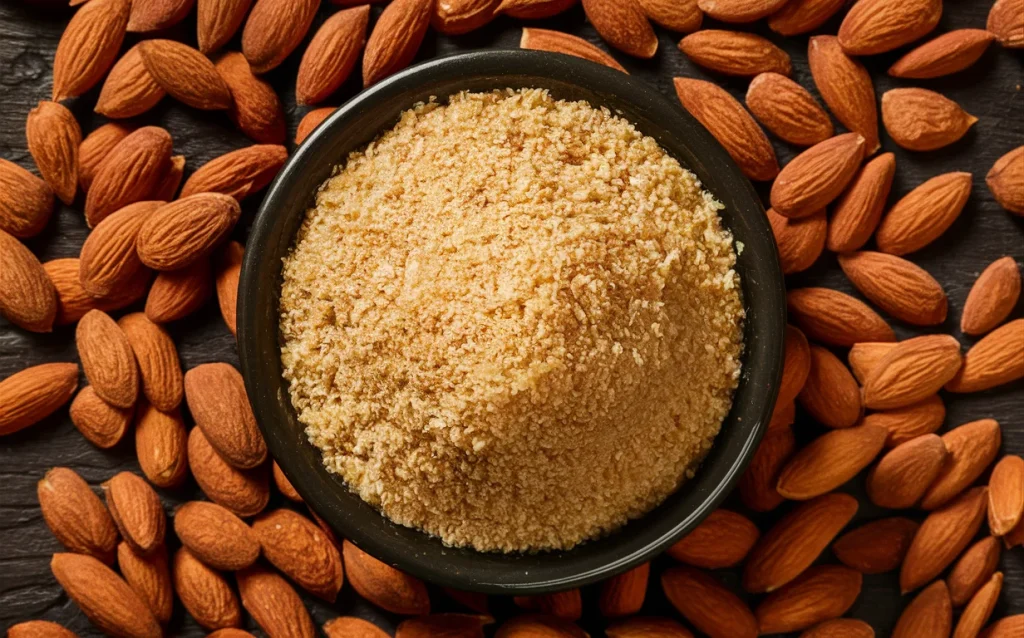Almond meal, also known as almond flour, is a versatile and nutritious ingredient that has gained popularity in the baking world. Made from ground almonds, this gluten-free flour alternative offers a range of benefits for both home bakers and professional chefs. With its rich flavor, soft texture, and impressive nutritional profile, almond meal has become a staple in many kitchens, particularly for those seeking healthier baking options. This article will explore the definition, differences, and the many advantages of incorporating almond meal into your baking repertoire.

Key Takeaways
- Almond meal is a finely ground, gluten-free flour alternative made from whole, raw almonds.
- Almond meal is rich in protein, fiber, and healthy fats, making it a nutritious ingredient for baking.
- Almond meal can be used in a variety of baking applications, including gluten-free and low-carb recipes.
- Almond meal can enhance the texture and flavor of baked goods, providing a slightly crunchy and nutty taste.
- Almond meal is versatile and can be used in recipes for cookies, pancakes, bread, and more.
What is Almond Meal?
Almond meal, also known as almond flour, is a finely ground flour made from whole, raw almonds. It is produced by grinding blanched, skinless almonds into a fine powder. Almond meal is similar to almond flour, but the two are not exactly the same.
Definition and Explanation
Almond meal is a versatile ingredient that has gained popularity in the baking world. It is a gluten-free flour alternative that offers a range of benefits for both home bakers and professional chefs. Almond meal is made by grinding whole, raw almonds into a fine powder, retaining more of the almond’s natural texture and flavor.
Difference from Almond Flour
In contrast, almond flour is made from blanched almonds that have been ground into an even finer texture, resulting in a softer and more consistent flour-like consistency. While both almond meal and almond flour are gluten-free and can be used as substitutes for wheat flour in a variety of baking applications, the slightly coarser grind of almond meal may provide a unique texture and flavor profile to certain recipes.
Nutritional Benefits of Almond Meal
Almond meal is a highly nutritious ingredient that offers a range of health benefits. It is rich in protein, with one ounce (28 grams) of almond meal containing approximately 6 grams of protein. Almond meal is also a good source of dietary fiber, with 3 grams of fiber per ounce. The healthy fats found in almonds, such as monounsaturated and polyunsaturated fats, are retained in almond meal, making it a valuable addition to a balanced diet. Additionally, almond meal is low in carbohydrates, making it a popular choice for those following low-carb or keto-friendly diets.
Rich in Protein and Fiber
One of the primary nutritional benefits of almond meal is its high protein and fiber content. With 6 grams of protein and 3 grams of fiber per ounce, almond meal can be a valuable addition to a balanced diet, providing essential nutrients to support overall health and well-being.
Source of Healthy Fats
Almond meal is also a rich source of healthy fats, including monounsaturated and polyunsaturated fats. These healthy fats can help support cardiovascular health, reduce inflammation, and contribute to a balanced diet.
Low in Carbohydrates
In addition to its impressive nutrient profile, almond meal is low in carbohydrates, making it a popular choice for individuals following low-carb or keto-friendly diets. This nutritional property allows almond meal to be a versatile ingredient in a variety of baking applications, catering to those with specific dietary needs or preferences.
| Nutrient | Amount per Ounce (28g) |
|---|---|
| Protein | 6g |
| Fiber | 3g |
| Total Carbohydrates | 6g |
| Healthy Fats | 14g |
Almond Meal in Baking
Almond meal is a versatile ingredient that can be used in a variety of baking applications. One of the primary benefits of almond meal is its suitability for gluten-free baking. As a naturally gluten-free flour alternative, almond meal can be used to replace wheat flour in recipes, making it a popular choice for those with gluten sensitivities or following a gluten-free diet.
Additionally, almond meal can contribute to the texture and flavor of baked goods. Its slightly coarse texture can add a pleasant crunch, while its nutty flavor can enhance the overall taste of cakes, cookies, breads, and more. Incorporating almond meal in baking can elevate the quality and appeal of a wide range of baked goods, from delicate pastries to hearty loaves.
Whether you’re using almond meal for gluten-free baking or simply looking to add a unique twist to your favorite recipes, this versatile ingredient offers a range of opportunities for the discerning baker. By harnessing the almond meal texture and flavor, you can create baked goods that are not only delicious but also nutritious and visually appealing.
Almond Meal Recipes
Almond meal is a versatile ingredient that can be used in a wide range of baked goods. From delicious almond meal cookies to fluffy almond meal pancakes and hearty almond meal bread, this ingredient can be incorporated into a variety of recipes.
Almond Meal Cookies
Almond meal cookies offer a tender, slightly crunchy texture and a rich, nutty flavor. The combination of almond meal, along with other wholesome ingredients, creates a satisfying and guilt-free treat. These cookies are perfect for those following a gluten-free or low-carb diet, as almond meal is a naturally gluten-free and low-carb flour alternative.
Almond Meal Pancakes
Almond meal pancakes are a gluten-free and protein-packed breakfast option. The almond meal adds a delicious nutty taste and helps create a fluffy, yet substantial, texture. Topped with fresh fruit, maple syrup, or your favorite toppings, these almond meal pancakes make for a nourishing and delectable morning meal.
Almond Meal Bread
Almond meal bread provides a satisfying alternative to traditional wheat-based loaves. The almond meal lends a moist and dense crumb, while also contributing a rich, nutty flavor. This gluten-free bread is perfect for those who wish to incorporate more nutritious ingredients into their baking routine. Almond meal bread can be enjoyed on its own or used as a base for sandwiches and toast.
FAQ
What is almond meal?
Almond meal is a finely ground flour made from whole, raw almonds. It is produced by grinding blanched, skinless almonds into a fine powder. Almond meal is similar to almond flour, but the two are not exactly the same. Almond flour is made from blanched almonds that have been ground into an even finer texture, resulting in a softer and more consistent flour-like consistency.
What are the nutritional benefits of almond meal?
Almond meal is a highly nutritious ingredient. It is rich in protein, with one ounce (28 grams) of almond meal containing approximately 6 grams of protein. Almond meal is also a good source of dietary fiber, with 3 grams of fiber per ounce. Additionally, almond meal is a valuable source of healthy fats, such as monounsaturated and polyunsaturated fats, and is low in carbohydrates, making it a popular choice for those following low-carb or keto-friendly diets.
How can almond meal be used in baking?
Almond meal is a versatile ingredient that can be used in a variety of baking applications. One of the primary benefits of almond meal is its suitability for gluten-free baking. As a naturally gluten-free flour alternative, almond meal can be used to replace wheat flour in recipes, making it a popular choice for those with gluten sensitivities or following a gluten-free diet. Additionally, almond meal can contribute to the texture and flavor of baked goods, adding a pleasant crunch and nutty flavor to cakes, cookies, breads, and more.
What are some almond meal recipes?
Almond meal can be used in a wide range of baked goods. Some popular almond meal recipes include almond meal cookies, which offer a tender, slightly crunchy texture and a rich, nutty flavor; almond meal pancakes, a gluten-free and protein-packed breakfast option; and almond meal bread, a satisfying alternative to traditional wheat-based loaves.











